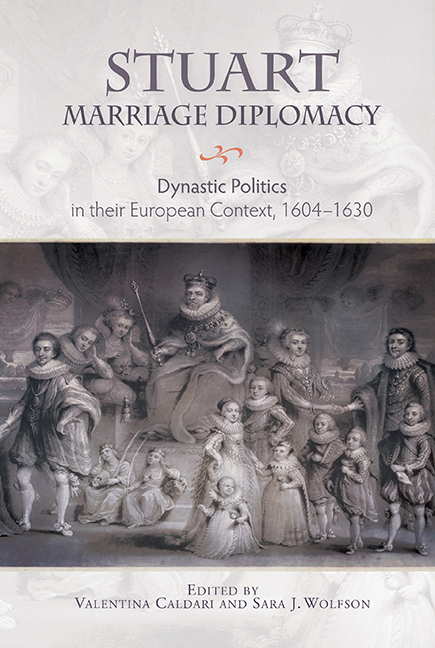Book contents
- Frontmatter
- Contents
- List of Illustrations
- List of Contributors
- Acknowledgements
- List of Abbreviations
- Introduction
- Part One Marriage and the Court
- Part Two Marriage and Politics
- Part Three Marriage and War
- Part Four Marriage and News
- 12 Secrecy, Counsel and Public Opinion during the Spanish and French Matches
- 13 The Spanish Match and Anglo-Dutch Publicity
- 14 ‘Whereof the world now stands in admiration’: Reporting on the Spanish Match from the Habsburg Netherlands
- Part Five Marriage and Continental Europe
- Part Six Marriage and Ceremony
- Bibliography
- Index
- Studies in Early Modern Cultural, Political and Social History
14 - ‘Whereof the world now stands in admiration’: Reporting on the Spanish Match from the Habsburg Netherlands
from Part Four - Marriage and News
Published online by Cambridge University Press: 24 October 2019
- Frontmatter
- Contents
- List of Illustrations
- List of Contributors
- Acknowledgements
- List of Abbreviations
- Introduction
- Part One Marriage and the Court
- Part Two Marriage and Politics
- Part Three Marriage and War
- Part Four Marriage and News
- 12 Secrecy, Counsel and Public Opinion during the Spanish and French Matches
- 13 The Spanish Match and Anglo-Dutch Publicity
- 14 ‘Whereof the world now stands in admiration’: Reporting on the Spanish Match from the Habsburg Netherlands
- Part Five Marriage and Continental Europe
- Part Six Marriage and Ceremony
- Bibliography
- Index
- Studies in Early Modern Cultural, Political and Social History
Summary
Various types of printed news provide a hidden substrate of early modern historiography, informing numerous annals and histories written during the seventeenth and eighteenth centuries. Academic historians of the discipline that emerged in the nineteenth century favoured state papers as providing privileged access to what was being thought, planned and commanded by those in power, deprecating newspapers and their like as providing no reliable sense of what had actually happened. Historians today are recovering news publications as a valuable source of life in the period, in part at least to reconstruct the miasma of rumour, speculation, and conflicting reports through which those living at the time perceived events.
This essay will consider the specific case of coverage of the Spanish match in the Habsburg Netherlands, examining not only the reports printed in the region, primarily in Antwerp, but also reports, primarily from Brussels, that were printed in German-speaking Europe. Before doing so, it will provide a general sketch of the European media landscape that in early 1623 reverberated with news of Prince Charles's journey to Spain. Intriguingly, the newspapers of seventeenth-century Europe not only carried news of this exceptional event, their composition was changed by it. As a result of the seemingly impending marriage, editors in Germany turned more readily to Brussels as a source of news from England and Spain, while the newspapers printed in Antwerp began to carry news from England on a more regular basis. The type and the timing of coverage are also suggestive of some of the interactions between government and media in early modern Europe.
The media landscape
In 1623 the newspaper press was still young. The earliest surviving issues of weekly newspapers were printed in Strasbourg and in Wolfenbüttel in 1609. Archival references show that the Strasbourg Relation, the oldest European newspaper known, had begun publication in 1605. By 1623, newspapers were being printed not only across German-speaking Europe, but also in the Low Countries and in London, where they were a comparatively recent phenomenon.
Not that this was the beginning of current-affairs printing. With increasing frequency throughout the sixteenth century, news had been publicized in print, often in pamphlets that covered a single striking event.
- Type
- Chapter
- Information
- Stuart Marriage DiplomacyDynastic Politics in their European Context, 1604–1630, pp. 227 - 240Publisher: Boydell & BrewerPrint publication year: 2018



